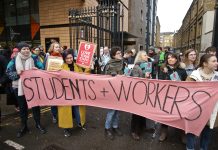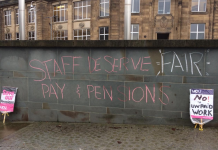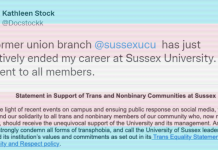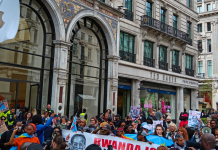Matt Myers reports from the ongoing occupation at the London School of Economics, and considers what it tells us about the modern university.
It was a very odd way to start an occupation, being presented with edible offerings and an ironic solidarity fist salute by LSE’s Vice Chancellor (VC), Craig Calhoun, the highest paid individual of any university in the United Kingdom. The occupation was laden, from the first day, with copious amounts of food provided by various levels of management, including the Finance Department. Yet, as the anthropologist Marcel Mauss argues, gifts are not always altruistic. They involve the exertion of power and the establishment of authority. The university management’s response to Occupy LSE says a great deal about the culture of politics in Britain today, as well as how managers at our universities understand and perform their authority in the post-1968 era.
On Tuesday 17th of March, Occupy LSE reclaimed the Vera Anstey room (the space for all major meetings of LSE management) at the heart of the ‘Old Building’, in the name of free education, workers’ rights, university democracy, divestment (from fossil fuels and the Israeli occupation of Palestine, and liberation (which involves feminist and anti-racist demands): A full list of demands can be found here. Yet unlike in in the post 1967 occupations there was no ‘red base’ advocated by some members of the LSE Socialist Society, no New Left Review spokesperson suggesting raiding the nearby sea-cadets training school to seize rifles to scare the police[1], and no slogans like ‘Down with the Pedagogy of the Gerontocracy’[2]. Instead Occupy LSE has been organized on a different basis (with consensual, horizontal, meetings called ‘General Assemblies’ at its heart), with radically different cultural frames of reference responding to a very different institution. Instead of the Agitator journal of the LSE Socialist Society, Occupy LSE has social media – Facebook, Twitter, and a Tumblr blog, with thousands of followers. Instead of Guevarist slogans of the late 60s there is ‘LSE should be Free’ and ‘Whose LSE? Our LSE’. Certain themes around alienation and commodification remain unchanged, with slogans such as ‘We are Students Not Commodities’, but the tone of the occupation’s cultural output is distinct from earlier eras.
But in many ways some things don’t change. LSE started a wave of occupations at Kings College, at Goldsmiths, and University of Arts London (who are currently facing large cuts to their Foundation Courses), while six occupiers at the University of Amsterdam hitchhiked their way to Houghton Street to create an international network of students. Occupy LSE has hosted many sympathetic journalists, academics and speakers, such as Owen Jones, David Graeber, Danny Dorling, and a representative from Lesbians and Gays Support the Miners (LGSM), featured in the film Pride (2014). The LSE occupation has received solidarity messages from around the world, from Quebec, Switzerland, Chile, Italy, China, Turkey and Mexico, among others.
Against the occupation stood a new management team with a new Vice Chancellor facing its first occupation since the successful March 2011 occupation that unseated the old VC, Howard Davies, over links with Gaddafi, and rocked by a ban imposed on the LSE Rugby club over a misogynistic, racist and homophobic leaflet at Fresher’s Fair. LSE management would also have known of the dynamics of student occupations, some possibly from personal participation, and would have been rightly cautious of escalation. Evidence from the 2013 Senate House Occupation (leading to an even greater ‘Cops Off Campus’ mobilization) or the December 2014 Warwick Occupation marred by extreme police violence, as well as the notorious ‘kettling’ of the 2010 student demonstrations, showed that repression of student protest usually leads to deeper and prolonged mobilization, not less. Only in the past few days has the management raised the threats of legal proceedings if we do not vacate the space. It is important to note that unlike in previous LSE occupations (such as in 2010 and 2011), and most other UK occupations, this threat of legal action came only 2 weeks after our occupation started, not immediately after. The LSE occupation has therefore been left alone, for the first two weeks since the 17th of March, with its doors permanently open and the daily rituals of the university security unaffected. LSE management have, it seems, learnt their lessons from the past.
The management strategy became more obvious after the first week. In response to a planned action by the occupation, for ‘anti-tour-guides’ to leaflet on an Open Day for potential LSE students, the LSE management sent around a memo on Tuesday 24th March. Instead of warning of the occupation, and encouraging a wide berth by the tour-guides, the management memo encouraged interaction with the occupation and the ‘rational and well-informed’ occupiers – apparently occupations and democratic politics were ‘part of the LSE experience’ and shouldn’t be ignored.
So not only were the occupation’s demands failing to gain traction, but the occupation was now being used to sell an LSE as an institution. First the homemade cupcakes offered by the Vice Chancellor (which were delicious, if very rich) and now patronising appropriation for material gain – first as tragedy, second as farce. Occupy LSE had become unwitting ‘value-creators’ for LSE’s image.
Occupy LSE, in its founding statement, made clear that the ethos of the neoliberal university is where the institution ‘sells-itself’ to potential clients (i.e. students) seeking ‘value-adding’ work processes (i.e. education) administered by profit-making service providers (i.e. universities) and employed workers (i.e. lecturers) to work on individual ‘human capital’ so as to improve ‘earning potential’ in the world of work. It was clear in the occupation’s outreach that the marketisation of higher education and the imposition of fees has changed the culture of students and institutions, creating entrenched interests and cultural perceptions which have become ‘sticky’. Many students that Occupy LSE canvassed were very critical or unamused at the occupation – some complaining that we were ‘ruining the image’ of the institution they had paid so much to attend and whose logo added so much value to their CV. When universities charge so much for one to attend, it produces, by the very nature of the monetary investment and debt involved, a cultural mentality where education acts as a service which must have a clear dividend to be profitable (usually a well-paying job). This kind of culture seemed prevalent amongst a sizable minority of students inside the LSE student body, a great deal of whom are the offspring of the international ruling elite. This partly explains why the occupation has bolstered its support from lecturers and university workers as much as students.
Yet at the same time as treating the university as a business, students as consumers, lecturers as providers of ‘value-adding’ services, and degrees serving as instruments for increasing ‘earning potential’, the class of managers also acknowledges the deep spiritual gap left by this process of commodification. The university truly becomes a factory, where the institution, and the individual subjects it produces, measures the price of everything, but the value of nothing. In the eyes of LSE management, those potential students not enamoured with the ultra-capitalist culture permeating their lives, those students wishing for a counter-cultural ‘edge’, to dabble in protest and perform pre-rehearsed contention before inevitably entering the financial, technical, political, and cultural ruling elites, can, they urge, now always briefly enter radical student politics like occupations. Without wasting any labour or financial resources, the institution, in sound business-logic, has a new resource to sell and reproduce itself.
Hegemony at the university is now so entrenched, so sure of itself, that students are faced only with being patronised, or well meaning ‘dialogue’ matched by deathly silence when it comes to practical change. In all four meetings with four representatives of senior management the response has been similar – your demands either cannot be acceded too (as they contravene various legal or bureaucratic considerations) or they are being dealt with through existing channels. The most risible response being that LSE could not campaign for ‘Free Education’ funded by public taxation, as this would contravene the (public) institution’s ‘charitable status’. This forgets that LSE, behind closed doors, has been lobbying the government for a lifting of the cap to allow unlimited fees in the US-model, even while seeing the current fees regime net the institution a large surplus in profits[3].
The occupation has not yet finished, but it already has some important lessons for how we understand how universities are governed today and under what conditions seemingly apathetic students start to engage politically inside and outside the institutions that play-host to their lives.
[1] Martin Shaw, International Socialism, April/May 1969
[2] LSE Socialist Society, LSE: What it is and How We Fought It, 1967
[3] Andrew McGettigan, Speech to the LSE Occupation, March 20th 2015, and his book The Great University Gamble: Money, Markets and the Future of Higher Education (2013)





















[…] suggesting raiding the nearby sea-cadets training school to seize rifles to scare the police[1], and no slogans like ‘Down with the Pedagogy of the Gerontocracy’[2]. Instead Occupy LSE has […]
[…] > Whose futures are subsumed in this rush to measure?< Occupy LSE, in its founding statement, made clear that the ethos of the neoliberal university is where the institution ‘sells-itself’ to potential clients (i.e. students) seeking ‘value-adding’ work processes (i.e. education) administered by profit-making service providers (i.e. universities) and employed workers (i.e. lecturers) to work on individual ‘human capital’ so as to improve ‘earning potential’ in the world of work. It was clear in the occupation’s outreach that the marketisation of higher education and the imposition of fees has changed the culture of students and institutions, creating entrenched interests and cultural perceptions which have become ‘sticky’. Many students that Occupy LSE canvassed were very critical or unamused at the occupation – some complaining that we were ‘ruining the image’ of the institution they had paid so much to attend and whose logo added so much value to their CV. When universities charge so much for one to attend, it produces, by the very nature of the monetary investment and debt involved, a cultural mentality where education acts as a service which must have a clear dividend to be profitable (usually a well-paying job)…. Yet at the same time as treating the university as a business, students as consumers, lecturers as providers of ‘value-adding’ services, and degrees serving as instruments for increasing ‘earning potential’, the class of managers also acknowledges the deep spiritual gap left by this process of commodification. The university truly becomes a factory, where the institution, and the individual subjects it produces, measures the price of everything, but the value of nothing. Matt Myers. 2015. Report from the LSE occupation. […]